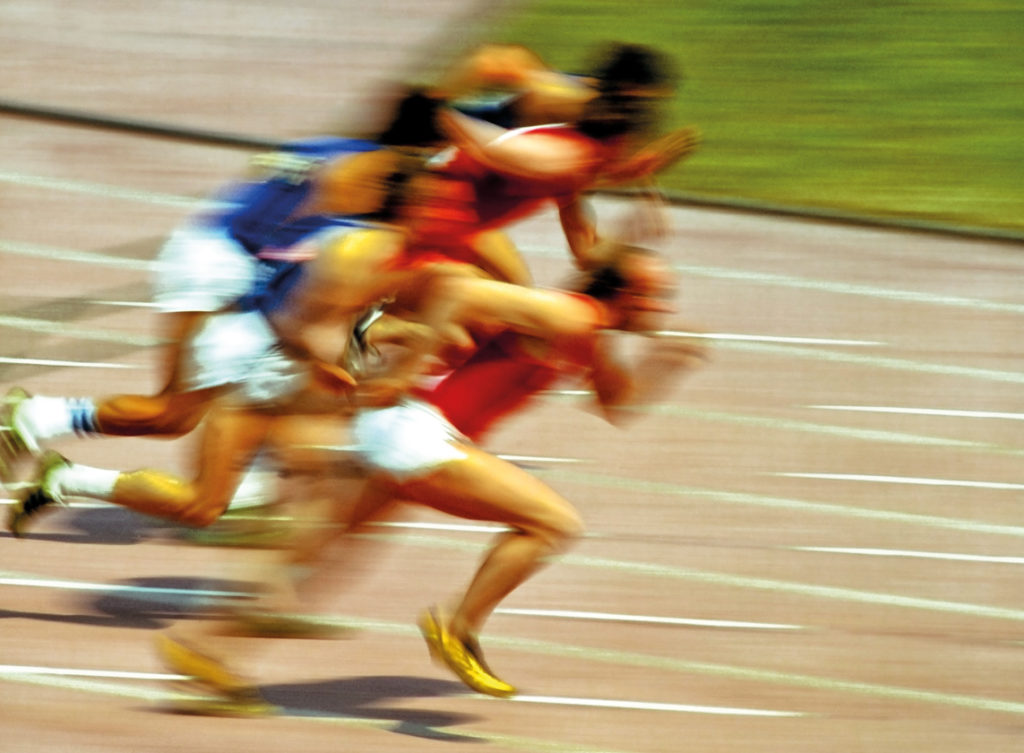
Scan the start line of any elite-level race – or look at the top three finishers of your local parkrun – and it’s clear running is a sport that favours the lean.
The reason why should come as no great surprise. Pit two equally talented runners against each other, one with low body fat and one with a little extra timber, and the leaner runner is likely to win. Why? Because they are unburdened by bulk. Carrying less fat makes it easier for oxygen to be transported around your body (your VO2 max). And if your muscles are receiving plenty of oxygen, you’re less likely to fatigue. Therefore, if you want to improve your running, you simply have to shed a few pounds, right?
Not quite. Because while most people would benefit from slimming down, there are two important distinctions that need to be made. The first is that low body fat does not necessarily mean low body weight. Sprinters are the prime example; they have incredibly low body fat, but often weigh in excess of 80kg – Justin Gatlin is 83kg, Usain Bolt is 94kg.
Muscle is far denser than fat (muscle does not weigh more than fat, any more than a pound of rock weighs more than a pound of feathers) and therefore occupies less space within the body. This explains why sprinters are in peak physical condition, but are also very heavy. Now, for long-distance runners, excess muscle is no more useful than excess fat. It’s simply unnecessary weight. But strength is also paramount, and strength is a product of a certain amount of muscle.
The second distinction is this: being thin is different to being lean. Lean is beneficial, thin can be the opposite. Ben Barwick, running coach at Full Potential (fullpotential.co.uk), elaborates: “It is no surprise that elite athletes are generally lean, but they are also incredibly strong. If you look at the start line of any race, you will see athletes of various shapes and sizes. Each athlete will have a weight that is suitable for them. It sets a very dangerous precedent if athletes are aiming to be the thinnest they can be, especially if it comes at a risk to their long-term health.”
Matt Fitzgerald, author of How Bad Do You Want It? (Aurum Press, £14.99) and Racing Weight (VeloPress, £14.99), agrees that runners should be careful to maintain a healthy weight. Speaking of the dangers of inadequate nutrition, he says: “Short-term consequences include poor workout performance, poor recovery from workouts, and stagnating fitness. Long-term consequences include muscle wasting, reduced bone mineral density, compromised immune function, and frequent injury.”
Dieting dangers
So it is possible for runners to be too light. If you’re looking to trim down in a bid to quicken up, the key – as with anything – is to do so in a considered way. Barwick warns, in particular, against taking any drastic dieting measures. “You can do real damage to your body if you start following diets that restrict certain food groups,” he says. “There is a real chance you won’t be taking in vital nutrients and minerals needed to keep your body healthy. If you are dieting, there is a chance that you won’t be putting enough fuel into your body and will struggle to train effectively as a result.”
So what is the safest way to lose weight? “Work with a qualified nutritionist or sports scientist to find the right weight for you,” Barwick continues. “Nutrition should be one of the cornerstones of your training plan; what you put into the system has a direct impact on what you get out. If you eat healthier, you’ll feel better. Get to know where your food is coming from, cook from scratch as often as possible and try to eat a balanced diet. If you are looking to lose a bit of weight, start with your portion sizes and focus on getting more plants on your plate.”
To achieve the lean but strong physique of the best runners, it’s also vitally important to add some strength work to your weekly schedule. And the gym-phobic runner can rest assured that lifting weights doesn’t have to mean bulking up. As Barwick says: “Unless you are lifting to build bulk, you aren’t going to put on extra size. It’s true that if you are working to get stronger, you may end up a bit heavier because muscle is denser than fat. However, this muscle will help you to run faster.”
For any runner looking to improve, then, slimming down may help, but only after seeking expert guidance and never if it’s going to compromise strength. Fitzgerald’s Racing Weight explains how an athlete can safely and effectively reach their optimum weight, and the accompanying My Racing Weight Calculator gives an initial idea about what weight one would need to be to reach peak performance. “An individual runner’s optimal racing weight,” he says, “is defined by his lowest realistically achievable healthy body-fat percentage, which in turn is influenced by age, gender, genetics, and weight history.”
So, is thinner faster? “Not if thin is detrimental to your overall health,” says Barwick. “If you have some excess pounds to shed, then dropping them is going to make you a faster runner because you’ll be carrying less around on your run. What we ultimately want, though, is athletes to be lean, muscularly well developed and strong.”






